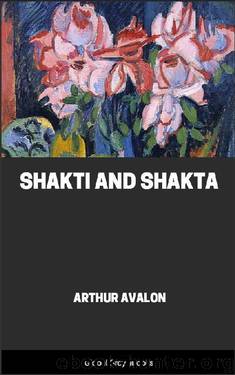Shakti and Shakta by Arthur Avalon

Author:Arthur Avalon [Avalon, Arthur]
Language: eng
Format: epub
Publisher: Global Grey ebooks
Published: 2018-11-22T00:00:00+00:00
* * *
Chapter Eighteen. Shakta Advaitavada
I have often been asked -- In what consists the difference between Vedanta and 'Tantra'. This question is the product of substantial error, for it assumes that Tantra Shastra is not based on Vedanta. I hope that, after many years of work, I have now made it clear that the Tantra Shastra or Agama (whatever be its ultimate origin as to which little is known by anybody) is now, and has been for centuries past, one of the recognized Scriptures of Hinduism, and every form of Hinduism is based on Veda and Vedanta. Another erroneous question, though less so, is -- In what consists the difference between Advaita Vedanta and 'Tantra' Shastra. But here again, the question presupposes a misunderstanding of both Vedanta and Agama. There are, as should be well known, several schools of Advaita Vedanta, such as Mayavada (with which too commonly the Advaita Vedanta is identified), such as the schools of the Northern Shaivagama, and Shuddhadvaita of Vallabhacarya. In the same way, there are different schools of doctrine and worship in what are called the 'Tantras', and a grievous mistake is committed when the Tantra is made to mean the Shakta Tantra only, such as is prevalent in Bengal and which, according to some, is either the product of, or has been influenced by Buddhism. Some English-speaking Bengalis of a past day, too ready to say, "Aye aye," to the judgments of foreign critics, on their religion as on everything else, and in a hurry to dissociate themselves from their country's "superstitions," were the source of the notion which has had such currency amongst Europeans that, "Tantra" necessarily meant drinking wine and so forth.
A legitimate and accurate question is -- In what consists the difference between, say, the Mayavadin's Vedanta and that taught by the Shakta Sampradaya of Bengal. One obviously fundamental difference at once emerges. The Agamas being essentially ritual or Sadhana Shastras are not immediately and practically concerned with the Yoga doctrine touching Paramarthika Satta taught by Shamkaracarya. A Sadhaka ever assumes the reality of the Universe, and is a practical dualist, whatever be the non-dual philosophical doctrines to which he may be intellectually attracted. He worships, that is assumes the being of some Other who is worshipped, that is a Real Lord who really creates, maintains, and really dissolves the Universe. He himself, the object of his worship and the means of worship are real, and his Advaita views are presented on this basis. It is on this presentment then that the next class of differences is to be found. What are they? The essence of them lies in this that the Sadhaka looks at the Brahman, through the world, whereas to the Mayavadin Yogi, placing himself at the Brahman standpoint, there is neither creation nor world but the luminous Atma. The Clear Light of the Void, as the Mahayanists call it, that alone is. Nevertheless, both the Advaita Sadhaka and the Advaita Yogi are one in holding that the Brahman alone is.
Download
This site does not store any files on its server. We only index and link to content provided by other sites. Please contact the content providers to delete copyright contents if any and email us, we'll remove relevant links or contents immediately.
| Chakras | Gandhi |
| History | Rituals & Practice |
| Sacred Writings | Sutras |
| Theology |
Fingersmith by Sarah Waters(2532)
Kundalini by Gopi Krishna(2180)
Wheels of Life by Anodea Judith(2144)
Indian Mythology by Devdutt Pattanaik(1936)
The Bhagavad Gita by Bibek Debroy(1929)
The Yoga of Jesus: Understanding the Hidden Teachings of the Gospels by Paramahansa Yogananda(1860)
Autobiography of a Yogi (Complete Edition) by Yogananda Paramahansa(1824)
The Man from the Egg by Sudha Murty(1812)
The Book of Secrets: 112 Meditations to Discover the Mystery Within by Osho(1673)
Chakra Mantra Magick by Kadmon Baal(1638)
The Sparsholt Affair by Alan Hollinghurst(1585)
Sparks of Divinity by B. K. S. Iyengar(1532)
Gandhi by Ramachandra Guha(1528)
Avatar of Night by Tal Brooke(1520)
Karma-Yoga and Bhakti-Yoga by Swami Vivekananda(1491)
The Bhagavad Gita (Classics of Indian Spirituality) by Eknath Easwaran(1487)
The Spiritual Teaching of Ramana Maharshi by Ramana Maharshi(1432)
Hindoo Holiday by J. R. Ackerley(1377)
Hinduism: A Very Short Introduction (Very Short Introductions) by Knott Kim(1374)
